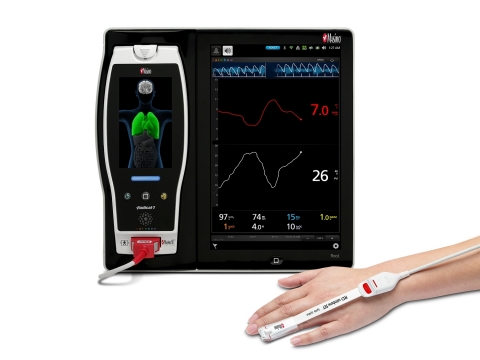Financial News
New Study Recommends the Use of Masimo PVi® to Guide Fluid Administration During Major Oncosurgery with Lung Ultrasonography
Masimo (NASDAQ: MASI) today announced the findings of an abstract presented at ANESTHESIOLOGY 2021 in San Diego, in which Drs. Anita Kulkarni and Arti Dalal at the Rajiv Gandhi Cancer Institute in New Delhi, India evaluated the use of noninvasive, continuous Masimo PVi® as part of goal-directed fluid therapy (GDFT) to guide intraoperative fluid administration during major oncosurgery in which lung ultrasonography (LUS) is used to diagnose extravascular lung water (EVLW). The researchers found that use of PVi, as a dynamic, continuous method of managing fluid administration, led to patients receiving less fluid and having fewer B-lines (a measure of EVLW), with no significant decrease in postoperative perfusion or oxygenation, compared to use of a central venous pressure (CVP)-guided fluid administration protocol.1
This press release features multimedia. View the full release here: https://www.businesswire.com/news/home/20211018005243/en/

Masimo Root® with PVi® and SpHb® (Photo: Business Wire)
Noting that conventional invasive methods of guiding fluid administration (such as CVP) during major oncosurgery may increase EVLW, which can lead to postoperative cardiorespiratory complications, the authors investigated whether use of a noninvasive, dynamic, continuous method—GDFT guided by Masimo PVi—could improve fluid management by reducing the amount of fluids administered and B-lines as measured by LUS. To evaluate PVi, they compared two groups of adult patients undergoing major oncosurgery with LUS: a group of 60 patients whose fluid administration was guided by PVi as part of GDFT and a group of 59 patients whose fluid administration was guided by CVP. Their primary outcome was detection of EVLW indicated by the total number of B-lines, and their secondary outcome was adequacy of perfusion by lactate levels at the end of surgery. The authors also measured arterial blood gas samples at baseline and the end of surgery to evaluate oxygenation.
Comparing the amount of fluids administered, the researchers found there were significantly fewer total crystalloids given in the PVi group (1875.8 ± 593.9 ml) compared to the CVP group (2132.6 ± 504.5 ml; p = 0.012), as well as significantly less colloid provided in the bolus (PVi group: 584 ± 358.5 ml; CVP group: 778.2 ± 242.2 ml; p = 0.001). They found that 23.3% of PVi-group patients had “mild” B-lines and 5.0% “moderate” B-lines, compared to 44.1% mild and 5.1% moderate in CVP-group patients (p = 0.042). At the end of surgery, they found that in the CVP group, there was a statistically significant decrease (p < 0.05) in partial pressure of oxygen in arterial blood (PaO2) and the ratio of arterial blood oxygen partial pressure to fractional inspired oxygen (PaO2/FiO2), compared to baseline levels; in the PVi group, the parameters were comparable to baseline after surgery, with no significant difference.
The authors concluded, “We recommend lung ultrasonography after completion of major oncosurgeries to detect EVLW and intraoperative PVi-guided GDFT as these patients received less fluids, had less B-lines (mild) and no decrease in PaO2 or PaO2/FiO2 levels at [the] end of surgery.”
In the U.S., PVi is cleared as a noninvasive, dynamic indicator of fluid responsiveness in select populations of mechanically ventilated adult patients.
@Masimo | #Masimo
About Masimo
Masimo (NASDAQ: MASI) is a global medical technology company that develops and produces a wide array of industry-leading monitoring technologies, including innovative measurements, sensors, patient monitors, and automation and connectivity solutions. Our mission is to improve patient outcomes and reduce the cost of care. Masimo SET® Measure-through Motion and Low Perfusion™ pulse oximetry, introduced in 1995, has been shown in over 100 independent and objective studies to outperform other pulse oximetry technologies.2 Masimo SET® has also been shown to help clinicians reduce severe retinopathy of prematurity in neonates,3 improve CCHD screening in newborns,4 and, when used for continuous monitoring with Masimo Patient SafetyNet™ in post-surgical wards, reduce rapid response team activations, ICU transfers, and costs.5-8 Masimo SET® is estimated to be used on more than 200 million patients in leading hospitals and other healthcare settings around the world,9 and is the primary pulse oximetry at 9 of the top 10 hospitals as ranked in the 2021-22 U.S. News and World Report Best Hospitals Honor Roll.10 Masimo continues to refine SET® and in 2018, announced that SpO2 accuracy on RD SET® sensors during conditions of motion has been significantly improved, providing clinicians with even greater confidence that the SpO2 values they rely on accurately reflect a patient’s physiological status. In 2005, Masimo introduced rainbow® Pulse CO-Oximetry technology, allowing noninvasive and continuous monitoring of blood constituents that previously could only be measured invasively, including total hemoglobin (SpHb®), oxygen content (SpOC™), carboxyhemoglobin (SpCO®), methemoglobin (SpMet®), Pleth Variability Index (PVi®), RPVi™ (rainbow® PVi), and Oxygen Reserve Index (ORi™). In 2013, Masimo introduced the Root® Patient Monitoring and Connectivity Platform, built from the ground up to be as flexible and expandable as possible to facilitate the addition of other Masimo and third-party monitoring technologies; key Masimo additions include Next Generation SedLine® Brain Function Monitoring, O3® Regional Oximetry, and ISA™ Capnography with NomoLine® sampling lines. Masimo’s family of continuous and spot-check monitoring Pulse CO-Oximeters® includes devices designed for use in a variety of clinical and non-clinical scenarios, including tetherless, wearable technology, such as Radius-7® and Radius PPG™, portable devices like Rad-67®, fingertip pulse oximeters like MightySat® Rx, and devices available for use both in the hospital and at home, such as Rad-97®. Masimo hospital automation and connectivity solutions are centered around the Masimo Hospital Automation™ platform, and include Iris® Gateway, iSirona™, Patient SafetyNet, Replica™, Halo ION™, UniView®, UniView :60™, and Masimo SafetyNet™. Additional information about Masimo and its products may be found at www.masimo.com. Published clinical studies on Masimo products can be found at www.masimo.com/evidence/featured-studies/feature/.
ORi and RPVi have not received FDA 510(k) clearance and are not available for sale in the United States. The use of the trademark Patient SafetyNet is under license from University HealthSystem Consortium.
References
- Kulkarni A, Dalal A. Lung Ultrasonography for Diagnosing Extravascular Lung Water in Major Oncosurgeries. Presented at ANESTHESIOLOGY 2021, San Diego, California, October 9, 2021. Abstract #A1067.
- Published clinical studies on pulse oximetry and the benefits of Masimo SET® can be found on our website at http://www.masimo.com. Comparative studies include independent and objective studies which are comprised of abstracts presented at scientific meetings and peer-reviewed journal articles.
- Castillo A et al. Prevention of Retinopathy of Prematurity in Preterm Infants through Changes in Clinical Practice and SpO2 Technology. Acta Paediatr. 2011 Feb;100(2):188-92.
- de-Wahl Granelli A et al. Impact of pulse oximetry screening on the detection of duct dependent congenital heart disease: a Swedish prospective screening study in 39,821 newborns. BMJ. 2009;Jan 8;338.
- Taenzer A et al. Impact of pulse oximetry surveillance on rescue events and intensive care unit transfers: a before-and-after concurrence study. Anesthesiology. 2010:112(2):282-287.
- Taenzer A et al. Postoperative Monitoring – The Dartmouth Experience. Anesthesia Patient Safety Foundation Newsletter. Spring-Summer 2012.
- McGrath S et al. Surveillance Monitoring Management for General Care Units: Strategy, Design, and Implementation. The Joint Commission Journal on Quality and Patient Safety. 2016 Jul;42(7):293-302.
- McGrath S et al. Inpatient Respiratory Arrest Associated With Sedative and Analgesic Medications: Impact of Continuous Monitoring on Patient Mortality and Severe Morbidity. J Patient Saf. 2020 14 Mar. DOI: 10.1097/PTS.0000000000000696.
- Estimate: Masimo data on file.
- http://health.usnews.com/health-care/best-hospitals/articles/best-hospitals-honor-roll-and-overview.
Forward-Looking Statements
This press release includes forward-looking statements as defined in Section 27A of the Securities Act of 1933 and Section 21E of the Securities Exchange Act of 1934, in connection with the Private Securities Litigation Reform Act of 1995. These forward-looking statements include, among others, statements regarding the potential effectiveness of PVi® and the new study recommending the use of PVi (the “Study”). These forward-looking statements are based on current expectations about future events affecting us and are subject to risks and uncertainties, all of which are difficult to predict and many of which are beyond our control and could cause our actual results to differ materially and adversely from those expressed in our forward-looking statements as a result of various risk factors, including, but not limited to: risks related to our assumptions regarding the repeatability of clinical results; risks related to our belief that Masimo's unique noninvasive measurement technologies, including PVi, contribute to positive clinical outcomes and patient safety; risks that the researchers’ conclusion and recommendation based on the Study may not be accurate; risks related to our belief that Masimo noninvasive medical breakthroughs provide cost-effective solutions and unique advantages; risks related to COVID-19; as well as other factors discussed in the "Risk Factors" section of our most recent reports filed with the Securities and Exchange Commission ("SEC"), which may be obtained for free at the SEC's website at www.sec.gov. Although we believe that the expectations reflected in our forward-looking statements are reasonable, we do not know whether our expectations will prove correct. All forward-looking statements included in this press release are expressly qualified in their entirety by the foregoing cautionary statements. You are cautioned not to place undue reliance on these forward-looking statements, which speak only as of today's date. We do not undertake any obligation to update, amend or clarify these statements or the "Risk Factors" contained in our most recent reports filed with the SEC, whether as a result of new information, future events or otherwise, except as may be required under the applicable securities laws.
View source version on businesswire.com: https://www.businesswire.com/news/home/20211018005243/en/
Contacts
Media Contact:
Masimo
Evan Lamb
949-396-3376
elamb@masimo.com
More News
View More




Recent Quotes
View MoreQuotes delayed at least 20 minutes.
By accessing this page, you agree to the Privacy Policy and Terms Of Service.



